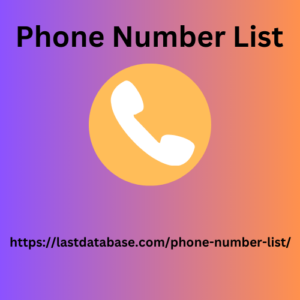Post by account_disabled on Nov 29, 2023 14:15:14 GMT 5
Which are often considered synonymous with classifying things, when in fact the two have very different properties: One category is the ontology value, which includes everything related to a specific topic, for example, in a link Under the Building category, we can find questions about broken link building, guest blogging, news syndication, image link attribution, etc.; Tags are horizontal classification values that reunify questions from different categories that share the same topic under their tags.
For example, tag infographics can be attached to issues listed in different categories Phone Number List such as web design, technical SEO, link building, and content blogging. the usability of a Q&A site: Help the questioner better clarify the nature of the question; Help Q&A community members (as well as casual visitors unfamiliar with the Q&A niche terminology) focus only on specific topics that interest them. Well, from a perspective of , especially due to the semantic-topic nature of tag pages. Using Category Pages as Topic Hubs When it comes to category pages, Q&A (and forums in general) may present us with some of the same uncertainties as categories in classified ads or e-commerce sites, the main one having to do with related to the category page. The page for the question itself. As far as I'm concerned (just speculating here for now.

The doubt is certainly greater since the categories for blogs tend to overlap with the categories for Q&A sections. This is immediately understandable if we look at the link building topic, which is both a Q&A and a Blog category (also because the Q&A category is modeled after the Blog category, which comes first). In this case, it was decided that the blog was its primary content asset (it had been so from the beginning), so the blog category should have priority. They took action to rank themselves higher than Q&A.
For example, tag infographics can be attached to issues listed in different categories Phone Number List such as web design, technical SEO, link building, and content blogging. the usability of a Q&A site: Help the questioner better clarify the nature of the question; Help Q&A community members (as well as casual visitors unfamiliar with the Q&A niche terminology) focus only on specific topics that interest them. Well, from a perspective of , especially due to the semantic-topic nature of tag pages. Using Category Pages as Topic Hubs When it comes to category pages, Q&A (and forums in general) may present us with some of the same uncertainties as categories in classified ads or e-commerce sites, the main one having to do with related to the category page. The page for the question itself. As far as I'm concerned (just speculating here for now.

The doubt is certainly greater since the categories for blogs tend to overlap with the categories for Q&A sections. This is immediately understandable if we look at the link building topic, which is both a Q&A and a Blog category (also because the Q&A category is modeled after the Blog category, which comes first). In this case, it was decided that the blog was its primary content asset (it had been so from the beginning), so the blog category should have priority. They took action to rank themselves higher than Q&A.


